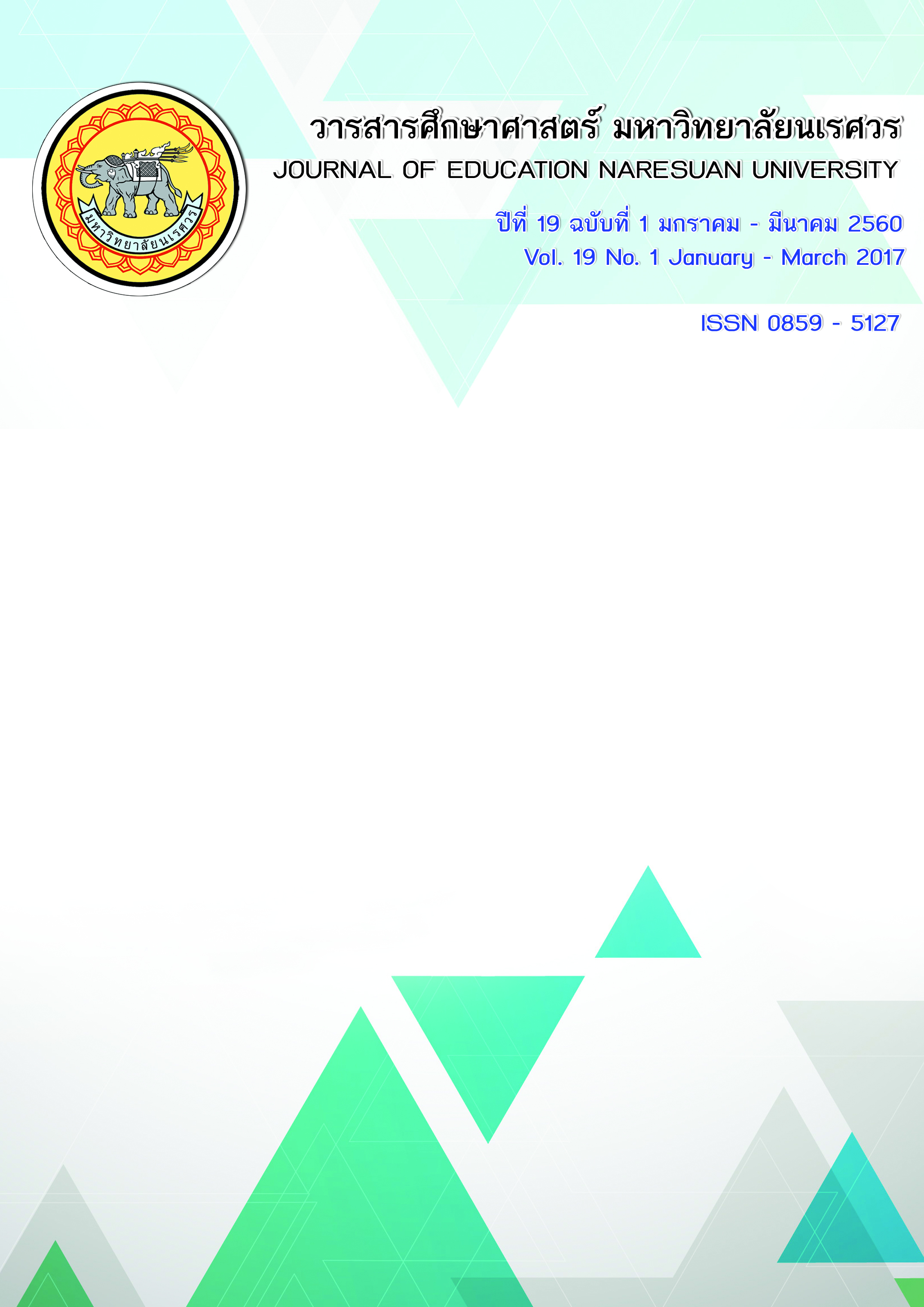การพัฒนาคู่มือฝึกอบรมการจัดการทรัพยากรน้ำในจังหวัดมหาสารคาม
Main Article Content
Abstract
การวิจัยครั้งนี้ มีวัตถุประสงค์เพื่อ 1) พัฒนาคู่มือการฝึกอบรมการจัดการทรัพยากรน้ำในจังหวัดมหาสารคาม ที่มีประสิทธิภาพตามเกณฑ์ 80/80 ศึกษาประสิทธิผลของคู่มือการฝึกอบรมการจัดการทรัพยากรน้ำในจังหวัดมหาสารคาม 2) ศึกษาและเปรียบเทียบความรู้ เจตคติ ทักษะการตรวจวัดคุณภาพน้ำเบื้องต้น และ 3) ศึกษาความพึงพอใจต่อการฝึกอบรมการจัดการทรัพยากรน้ำในจังหวัดมหาสารคาม กลุ่มตัวอย่างที่ใช้ศึกษา คือ นิสิตปริญญาตรีชั้นปีที่ 3 สาขาวิชาสิ่งแวดล้อมศึกษา คณะสิ่งแวดล้อมและทรัพยากรศาสตร์ มหาวิทยาลัยมหาสารคาม จำนวน 30 คนที่เข้าร่วมฝึกอบรม เครื่องมือที่ใช้ในการวิจัย ได้แก่ คู่มือฝึกอบรมการจัดการทรัพยากรน้ำในจังหวัดมหาสารคาม แบบทดสอบความรู้ แบบวัดเจตคติ แบบวัดทักษะการตรวจวัดคุณภาพน้ำเบื้องต้น และแบบวัดความพึงพอใจ สถิติที่ใช้ทดสอบคุณภาพเครื่องมือ ได้แก่ IOC ค่าความเชื่อมั่น (Reliability) ค่าอำนาจจำแนก ค่าความยากง่าย สถิติที่ใช้ในการวิเคราะห์ข้อมูล ได้แก่ ความถี่ ร้อยละ ค่าเฉลี่ย ส่วนเบี่ยงเบนมาตรฐาน และสถิติทดสอบสมมติฐาน Paired t-test ผลการวิจัย พบว่า
1. การพัฒนาคู่มือฝึกอบรมการจัดการทรัพยากรน้ำในจังหวัดมหาสารคาม มีประสิทธิภาพของคู่มือฝึกอบรม 91.33/83.77 ซึ่งเป็นไปตามเกณฑ์ 80/80 ที่ตั้งไว้ มีดัชนีประสิทธิผล (E.I.) เท่ากับ 0.635
2. นิสิตระดับปริญญาตรีชั้นปีที่ 3 มีคะแนนเฉลี่ยความรู้ เจตคติ ทักษะการตรวจวัดคุณภาพน้ำเบื้องต้น หลังการฝึกอบรมสูงกว่าก่อนการฝึกอบรมอย่างมีอย่างมีนัยสำคัญทางสถิติที่ระดับ .05
3. คะแนนเฉลี่ยความพึงพอใจต่อการฝึกอบรมการจัดการทรัพยากรน้ำในจังหวัดมหาสารคาม พบว่า นิสิตปริญญาตรีชั้นปีที่ 3 มีความพึงพอใจต่อการฝึกอบรมในระดับมาก
THE DEVELOPMENT OF TRAINING MANUALS ON WATER RESOURCES MANAGEMENT IN MAHA SARAKHAM PROVINCE
The purposes of this research were 1) to develop a training manual about water resources management in Maha Sarakham, at the effective as 80/80, to study about the effectiveness of the training manuals about water resources management in Maha Sarakham, 2) to compare knowledge, attitudes and skills regarding basic water quality monitoring before and after training of the water management, and 3) to study satisfaction of the training of water management in Maha Sarakham. The sample group of the study comprised 30 third-year undergraduate students in environmental education, Faculty of Environment and Resource Studies, Mahasarakham University by voluntary training participants. The research tools were training manuals about water resources management in Maha Sarakham, a knowledge test, an attitude test, and a test to measure the initial water quality and satisfaction measurement skills. Statistics for data analysis were frequency percentage, average, and standard deviation, statistics of test quality equipment are IOC, reliability, discrimination, and difficulty and statistical hypothesis testing paired t-test. The results show that
1. the development of the training manual on water resources management in
Maha Sarakham is effective by 91.33/83.77 (compared to 80/80), and the Effectiveness Index (E.I.) is 0.635;
2. the training of 3 year undergraduate students leads according to the research hypothesis to an average score of knowledge and attitudes towards water resources management in Maha Sarakham. Preliminary water quality monitoring skills after the training was higher than before training at a level of statistical significance .05;
3. the 3 year undergraduate students were satisfied with the training manual on warer quality management in Maha Sarakham.
Article Details
The owner of the article does not copy or violate any of its copyright. If any copyright infringement occurs or prosecution, in any case, the Editorial Board is not involved in all the rights to the owner of the article to be performed.


